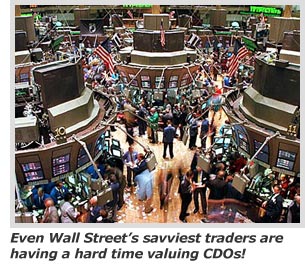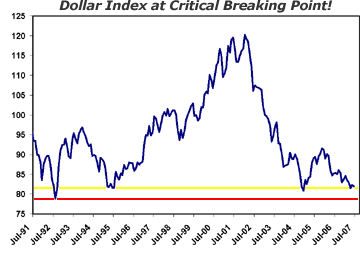Three Major Financial Market Trends You Must Watch
Stock-Markets / Financial Markets Jul 13, 2007 - 09:27 AM GMTMike Larson writes: There's so much going on out there in the markets, I almost don't know where to start. Stocks … bonds … currencies … they've been more volatile than I can remember in a long time.
But when I sort through the confusion, I see there are really three major trends driving the action. These three forces could very well hold the key to your investment performance over the next several months. So I want to share them with you right away …
Major Trend #1:
Chaos Breaking Out in the
Mortgage Bond Market
The Dow got clobbered this past Tuesday, losing almost 150 points. Why? Ratings agency Standard & Poor's threatened to downgrade more than $12 billion worth of bonds. Those bonds are backed by subprime mortgages — loans to borrowers with bad credit, little or no down payment, excessively high debt-to-income ratios, and other credit problems.
Moody's Investors Service, another ratings agency, added fuel to the fire later in the day. It cut its ratings on 399 mortgage bonds, and announced it may reduce ratings on another 32. The total value of investments downgraded: $5.2 billion.
Then, on Wednesday, Moody's went a step further. It warned that it might slash its ratings on $5 billion of so-called Collateralized Debt Obligations. These CDOs are complex fixed-income securities that hold bundles of commercial and residential mortgage bonds, auto loans, corporate debt, and other instruments.
Now, it doesn't take a rocket scientist to figure out that Moody's and S&P are late to the party … way late. Martin and I have been warning for more than a year that reckless lending and the housing slump would tear through the high-risk mortgage bond market like the Tasmanian devil.
Still, these moves by S&P and Moody's make it "official," and they could have a wide-ranging impact on the bond market.
Reason: Many fund managers aren't allowed to invest in debt securities once their credit ratings fall below certain levels. Should a flood of downgrades hit the tape, these money managers could be forced to dump mortgage bonds and CDOs into a market already struggling to digest boatloads of the darn things.
You want to know what's even more frightening? Even the smartest minds on Wall Street don't really know what a lot of these investments are worth. Nor do they know how bad the losses from the subprime mess will get. Just check out this excerpt from an eye-opening Bloomberg story …
"On Wall Street, where the $800 billion market for mortgage securities backed by subprime loans is coming unhinged, traders are belatedly acknowledging what they see isn't what they get.
"As delinquencies on home loans to people with poor or meager credit surged to a 10-year high this year, no one buying, selling or rating the bonds collateralized by these bad debts bothered to quantify the losses. Now the bubble is bursting and there is no agreement on how much money has vanished: $52 billion, according to an estimate from Zurich-based Credit Suisse Group earlier this week that followed a $90 billion assessment from Frankfurt-based Deutsche Bank AG."
It gets even better if you keep reading. I especially like this part of the piece:
"At least a third of hedge funds that invest in asset-backed bonds pick and choose values for their investment that help mask wide swings in performance, according to a survey of 1,000 funds worldwide by Paris-based Riskdata, a risk management firm for money managers.
"'If you have five different brokers you will get five different quotes, so if you don't have an objective valuation process you can choose the quote which for you is the most interesting,' said Olivier Le Marois, chief executive officer of Riskdata. 'There's no consensus on where the market price is.'"

In other words, many of the funds holding these complex, sliced-and-diced mortgage bonds, CDOs, and other esoteric investments just pick and choose how to value them. If that doesn't shake your confidence in the mortgage bond market, I don't know what will!
Major Trend #2:
Earnings Bombs Exploding
In the Housing Sector
We're getting into the heart of earnings season now, and in the housing sector, things don't look pretty. The second-largest U.S. home builder, D.R. Horton (DHI) just said net home orders plunged 40% year-over-year in the fiscal third quarter. Worse, the company's cancellation rate jumped to 38%, up from 32% in the fiscal second quarter and around 29% a year earlier.
Here's what Chairman Donald Horton had to say about the current environment,
"Market conditions for new home sales declined in our June quarter as inventory levels of both new and existing homes remained high, and we expect the housing environment to remain challenging. We adjusted our sales prices as selling conditions deteriorated, and we continue to react quickly to market dynamics."
Another builder, Ryland Group (RYL) , joined the warnings parade shortly thereafter. It said it would take a hefty charge of as much as $155 million to write down the value of land it's carrying in Arizona, California, Florida, and Nevada.
Lastly, Home Depot (HD) , the world's largest home improvement retailer, dropped a profit bomb of its own. The company said per-share earnings would drop 15% to 18% this fiscal year. Sales are on track to drop 2%, the first time they've declined in the company's entire history! Most telling was Home Depot's forecast that the housing market will "remain challenging for the rest of 2007 and into 2008."
Speaking of housing forecasts, the National Association of Realtors just cut its 2007 and 2008 sales outlooks … again. The group is now expecting existing-home sales to come in at 6.11 million units this year. They've been slowly walking this number down since February, when it was 6.44 million.
As you can see, both the mortgage bond and housing markets are in trouble. And there's something even more troubling out there …
Major Trend #3:
The Dollar Is Turning into
Confetti Before Our Eyes
Something shocking happened this week: The U.S. dollar plunged to a record low against the euro. A euro now buys around $1.375, eclipsing the previous high from December 2004.
Some people might argue that the euro has only been in existence since the beginning of 1999. And if it were just the euro, I might be inclined to agree that this event is of limited significance.
However, the dollar is falling in value against almost every major currency on the planet:
- The Australian dollar now buys more than 86 U.S. cents, up from around 48 in 2001. That's the most in almost two decades.
- The New Zealand dollar is worth around 78 U.S. cents. That's roughly double the 39 cents it bought back in 2000. It's also the highest level the currency has traded at since it was allowed to fluctuate freely in 1985.
- The British pound is on fire, too. It'll buy about $2.03, the most in 26 years.
- The Chinese yuan just hit a new high of 7.563 against the dollar. That puts it up more than 9% since July 2005, when China started allowing the currency to float gradually.
- The Brazilian real, as Martin has been telling you, is gaining virtually nonstop.
- Even the Indian rupee is rocking and rolling — up almost 10% against the dollar in 2007 alone.

In terms of technical levels, I'm keeping a close eye on the 80 to 80.39 area on the U.S. Dollar Index, a benchmark measure of the greenback's value.
If we break down through there, we'll have just one last-ditch level of technical support — 78.19, the all-time low set back in September 1992. Should that get taken out, there's no telling how far the dollar will fall.
Here's What These Trends Mean to You and Your Investments
First, financial stocks should continue to underperform. Banks. Brokers. Mortgage lenders. With few exceptions — such as foreign banks doing business in strong economies — they've been trading lower all year.
If there's one thing Wall Street hates, it's uncertainty. And as I told you earlier, nobody knows how deep this subprime rabbit hole goes. That's going to keep big-money investors on edge. So stay away from vulnerable lenders and banks.
Second, the housing market should remain weak. Bigger mortgage bond losses on Wall Street are translating into tighter mortgage credit on Main Street. As it becomes tougher for marginal home buyers to get loans, home sales and prices should slump even further.
Third, the dollar drop could turn into a major negative very quickly. So far, the falling dollar has been a net plus for smart U.S. investors. Those who have bought short-term foreign debt, foreign stocks, and foreign exchange-traded funds have enjoyed currency-related gains, on top of regular capital appreciation.
But as I mentioned a moment ago, the dollar decline could turn into a dollar rout. That, in turn, would likely rattle foreign holders of U.S. debt, spark even more import inflation, and potentially shake Wall Street out of its complacent state.
Bottom line: These are volatile times, with big winners and big losers. If you're positioned properly for this environment, you stand to make a boatload of money. If not, you could really get crushed. So keep your eyes open and stay alert for more of our updates!
Until next time,
By Mike Larson
This investment news is brought to you by Money and Markets . Money and Markets is a free daily investment newsletter from Martin D. Weiss and Weiss Research analysts offering the latest investing news and financial insights for the stock market, including tips and advice on investing in gold, energy and oil. Dr. Weiss is a leader in the fields of investing, interest rates, financial safety and economic forecasting. To view archives or subscribe, visit http://www.moneyandmarkets.com .
Money and Markets Archive |
© 2005-2022 http://www.MarketOracle.co.uk - The Market Oracle is a FREE Daily Financial Markets Analysis & Forecasting online publication.



